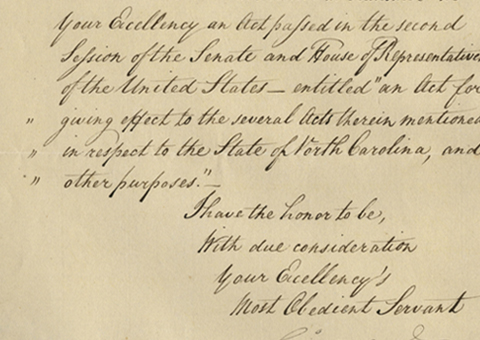John Clem, the “Drummer Boy of Chickamauga,” Writes to Former President Benjamin Harrison, Standing Up For the President’s Son



Clem and President Harrison had both served in the Civil War.
When President Lincoln called for volunteers to serve in the Union Army to put down the rebellion, one of those who tried to answer was a 9-year old orphan named John Clem. Refused by reason of age, Clem's persistence impressed the men of the 22nd Michigan, who adopted him as a mascot...
When President Lincoln called for volunteers to serve in the Union Army to put down the rebellion, one of those who tried to answer was a 9-year old orphan named John Clem. Refused by reason of age, Clem's persistence impressed the men of the 22nd Michigan, who adopted him as a mascot and unofficial drummer boy, and allowed him to stay with them. The officers chipped in to pay his monthly salary of $13 before he finally was allowed to officially enlist in 1863, at age 12. His unit was part of the Army of the Cumberland, commanded first by Gen. William Rosecrans and then by Gen. George Thomas.
Clem became a national celebrity for his actions at Chickamauga. Armed with a musket sawed down for him to carry, Clem joined the 22nd Michigan in the defense of Horseshoe Ridge on the afternoon of September 20, 1863. As the Confederate forces surrounded the unit, a Confederate colonel spotted Clem and ordered him to put down his gun. Rather than surrender, Clem shot the colonel and successfully made his way back to Union lines. General Thomas was so taken with the boy that he promoted Clem to sergeant, (making Clem the youngest soldier ever to become a noncommissioned officer in the U.S. Army), and assigned him to duties at his headquarters. Clem thereafter was known as the “Drummer Boy of Chickamauga;” and his benefactor, General Thomas, won the corresponding nickname of "The Rock of Chickamauga". Clem went on to fight at Perryville, Murfreesboro, Kennesaw Mountain and Atlanta, where he was wounded twice. He was discharged from the army in 1864 at age 13, but rejoined some years later. He retired on the eve of U.S. entry into World War I with the rank of major general, the last Civil War veteran to actively serve in the U.S. Army.
Both Clem and President Benjamin Harrison both served in the Civil War, which Harrison ending the war as a General. During the Spanish American War, Clem was Chief Quarter Master in Puerto Rico, while Harrison's son, Russell, was Inspector General. Russell was mustered out in 1900, in the face of some controversy, with Russell having to spend months attempting to clear his name and get his military pension. Clem felt it was his obligation to stick up for the son of his old friend and fellow soldier.
Typed letter signed, Headquarters. Department of Porto Rico, Chief Quarter Masters's Office letterhead, November 19, 1900, to former President and General Benjamin Harrison. "Dear General, as an old school-mate and friend of Russell's, I feel it is my duty to write you and give my opinion as an old Army officer. He has been treated outrageously. Colonel Harrison came to this Department very weak from the effects of yellow fever and started in to work just as though he was a well man. Inside of a month he had to go to the Hospital. Even this did not stop him from work. My son was in the hospital with your son, so that I saw them several times daily and always found the Colonel at work with his reports, etc. This is particularly cruel because his wife and family are en route to San Juan and expected tomorrow, and he has not time to reach the United States before he is mustered out. This is also remarkably unusual because an officer is always entitled to pay and transportation to his home.
"The fact that Colonel Harrison's success has been appointed before a vacancy occurred has created much adverse criticism in Army circles here. I don't believe there is a more efficient Volunteer Inspector in the Army and he certainly should not have been mustered out. Colonel Harrison has not an enemy in the Island. In fact, he is a universal favorite with all the Army people and every officer I have talked to considers that the Colonel has been badly and unfairly treated. No one justifies his being mustered out two weeks before the Department was broken up, and was a totally unnecessary and humiliating act.
"I have not seen as much of Indianapolis since I left there in 1870, after a most delightful sojourn at school, after my out in 65 as I would like. My last visit to Indianapolis was when you organized the Loyal Legion. With kind regards, Very sincerely, John L. Clem."
Harrison gave this letter to his son Russell to help him better support his position with the military. It comes with a copy of President Harrison's letter to Clem in Russell's hand.
This letter was acquired directly from the descendants of the Harrison family and has never before been offered for sale.

Frame, Display, Preserve
Each frame is custom constructed, using only proper museum archival materials. This includes:The finest frames, tailored to match the document you have chosen. These can period style, antiqued, gilded, wood, etc. Fabric mats, including silk and satin, as well as museum mat board with hand painted bevels. Attachment of the document to the matting to ensure its protection. This "hinging" is done according to archival standards. Protective "glass," or Tru Vue Optium Acrylic glazing, which is shatter resistant, 99% UV protective, and anti-reflective. You benefit from our decades of experience in designing and creating beautiful, compelling, and protective framed historical documents.
Learn more about our Framing Services









































































































